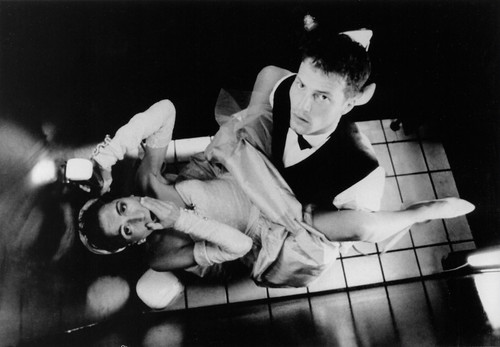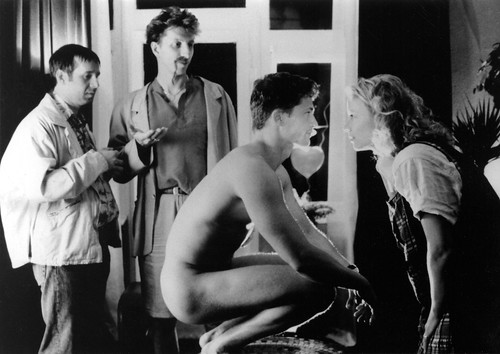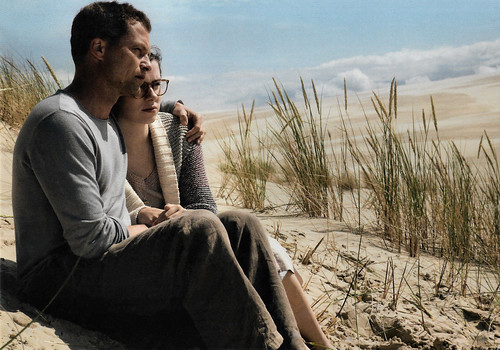
German autograph card. Photo: Bjoern Kommerell.

German postcard. Photo: Volker Corell.

German autograph card. Photo: Mathias Bothor.
Hunky Object Of Desire
Tilman Valentin ‘Til’ Schweiger was born in Freiburg, West Germany, in 1963. His parents were both teachers. He grew up with his two brothers in Heuchelheim near Giessen in Hesse, where he went to school.
First, he studied German and Medicine at the University, but in 1986 he chose for acting lessons at the drama school Der Keller in Cologne. After graduation in 1989, he played at several theatres in Cologne and Bonn. He first appeared onscreen in the TV series Lindenstraße (1989-1992). His first film role came with Manta, Manta/Racin' in the Street (Wolfgang Büld, 1991).
His international breakthrough followed with the comedy Der bewegte Mann/Maybe, Maybe Not (Sönke Wortmann, 1994), co-starring Joachim Król and Katja Riemann. Schweiger was a sensation as the hunky object of desire for both the women and the men in the film.
Der bewegte Mann was developed from the gay comics 'Der bewegte Mann' and 'Pretty Baby' by cult cartoonist Ralf König. With 6.5 million visitors in Germany, the film was the third biggest box office hit of the year in Germany. It also won several awards in Germany, including the German media award Bambi.
In 1995, Schweiger married American model Dana Carlson. The couple has four children: Valentin Florian Schweiger (1995), Luna Marie Schweiger (1997), Lilli Camille Schweiger (1998), and Emma Tiger Schweiger (2002).
His next film, Männerpension/Jailbirds (Detlev Buck, 1996) was again loaded with prizes, including a Bambi and a Jupiter as Best German film of the Year, and a Goldene Leinwand (Golden Screen) for its results at the German box offices.
In 1997, Schweiger made his debut as a producer and (uncredited) co-director with the crime comedy Knockin' on Heaven's Door (Thomas Jahn, 1997). The film is about two young terminal cancer patients (Jan Josef Liefers and Schweiger) who decide to take one last trip to the sea. However, the car they've stolen belongs to two thieves and contains a million marks. Soon they're being pursued by both thugs and cops. Knockin' on Heaven's Door became a cult favourite among cinema audiences worldwide.
Next, Schweiger directed, produced and starred in the action thriller Der Eisbär/The Polar Bear (Granz Henman, Til Schweiger, 1998).

German press photo. Til Schweiger in Der bewegte Mann/Maybe, Maybe Not (Sönke Wortmann, 1994).

German press photo. Joachim Król, Til Schweiger and Katja Riemann in Der bewegte Mann/Maybe, Maybe Not (Sönke Wortmann, 1994).

German press photo. Til Schweiger and Katja Riemann in Der bewegte Mann/Maybe, Maybe Not (Sönke Wortmann, 1994).
Big-budget Action Flops
Til Schweiger made his American acting debut in the crime thriller Judas Kiss (Sebastian Gutierrez, 1998), starring Alan Rickman and Emma Thompson.
It was followed by supporting parts in productions like the action films The Replacement Killers (Antoine Fuqua, 1998) starring Chow Yun-fat and Mira Sorvino, and Driven (Renny Harlin, 2001), starring Sylvester Stallone. Both were disappointing box office flops.
Smaller films were SLC Punk! (James Merendino, 1998) and the TV movie Joe and Max (Steve James, 2002), based on the legendary 1936 boxing fight of African-American heavyweight Joe Louis (Leonard Roberts) vs. German counterpart Max Schmeling (Schweiger), and Schmeling's secret heroism during World War II.
Like his earlier big-budget action films, Lara Croft Tomb Raider: The Cradle of Life (Jan de Bont, 2003), starring Angelina Jolie as Lara Croft, was another box office disappointment.
Next, he played supporting parts in King Arthur (Antoine Fuqua, 2004) featuring Clive Owen, the World War II submarine film In Enemy Hands/U-Boat (Tony Giglio, 2004), starring William H. Macy, and as Lucky Luke in the French Western comedy Les Dalton/The Daltons (Philippe Haïm, 2004), based on the popular comic by Morris.
In Germany, he appeared in (T)Raumschiff Surprise – Periode 1/Dreamship Surprise (Michael Herbig, 2004) in which several Star Trek and Star Wars characters are parodied. The Science Fiction satire draw 9.2 million visitors in Germany and was his most popular German production ever.
In 2005, Schweiger and his wife Dana Carlson separated, but they never divorced. Since 2010, Schweiger has been in a relationship with model Svenja Holtmann.

German autograph card. Photo: Joachim Gern.

German postcard by Peek & Cloppenburg.

Promotion card for Skiny. Source: Til Schweiger @ Flickr.
Back To Berlin
After the separation from his wife Dana, Til Schweiger moved to Berlin and started his own production company, Barefoot Films. He wrote, directed, and starred in the romantic comedy Barfuß/Barefoot (2005), which won the Bambi award as the Best German Film of 2005.
His next production, Keinohrhasen/Rabbit Without Ears (2007), which he wrote, directed, starred in and produced, was a surprise hit in Germany. With a box office result of USD 74,000,000, the romantic comedy, co-starring Nora Tschirner, became one of the most successful films in German theatres ever. The film won a Bambi, a Bavarian Film Award, the German Comedy Award, two DIVA Awards, a Jupiter Award and the Ernst Lubitsch Award.
The sequel, Zweiohrküken/Rabbit Without Ears 2 (2008) was also a huge success. Schweiger then went on to direct, produce and star in 1½ Ritter – Auf der Suche nach der hinreißenden Herzelinde/1½ Knights – In Search of the Ravishing Princess Herzelinde (2008), which was slashed by the critics, but also proved to be another cinema hit.
In Kokowääh (2011), Schweiger's daughter Emma stars beside him, and the film is also directed, co-written and produced by him. Kokowääh (referring to Coq au vin) received better reviews and was another popular success. Father and daughter reprised their roles in the sequel Kokowääh 2 (2013).
Besides his own films, Schweiger also played in many other films. He was unforgettable as the steely psychopath Sgt. Hugo Stiglitz, infamous for his brutal and sadistic ways of murdering Nazis in Quentin Tarantino's Inglourious Basterds (2009).
His recent international screen appearances were in the romantic comedy New Year's Eve (Garry Marshall, 2011), the action film The Courier (Hany Abu-Assad, 2011) with Mickey Rourke, and as an international criminal in the romantic spy comedy This Means War (McG, 2012), with Chris Pine and Reese Witherspoon. He can also be seen in Muppets Most Wanted (James Bobin, 2014).
According to the website Inside Kino, no other German actor has more star power and has drawn more people to international cinemas since 1990, than Til Schweiger.

German promotion card by Barefoot Film / Warner Bros Entertainment GmbH / Rothkirch / Cartoon Film / Seven Pictures Film GmbH, 2009. Photo: Warner Bros. Til Schweiger and Nora Tschirner in Zweiohrküken/Rabbit Without Ears 2 (Til Schweiger, 2008).
German trailer Der bewegte Mann (1994). Source: Unseen Trailers (YouTube).
Sources: AllMovie, Inside Kino, Wikipedia and IMDb.
No comments:
Post a Comment